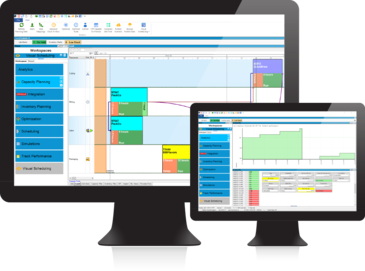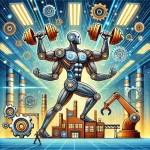SMART
FACTORY, INDUSTRY 4.0 & IOT
In the foreseeable future, technological integration will unify to create a cohesive, intelligent system known as the Internet of Things (IoT).
This progression will transform manufacturing facilities into interconnected smart factories, digitally linking every aspect from the shop floor to sales. This integration harnesses IoT-generated data, granting transparency into manufacturing operations, increasing collaboration between management and IT departments. This synergy dissolves the complexities of isolated silos, fostering a seamlessly integrated production environment.
IOT ON THE FACTORY FLOOR
To achieve this transition from traditional isolated manufacturing to advanced smart factories, three essential elements must converge:
- Connected machines: Digital communication between sensor-equipped factory machines, procurement departments leveraging intelligent software, digitally operated truck fleets, and materials suppliers.
- Real-time and predictive analytics: Utilizing robust algorithms for real-time data collection and automated analysis, transforming raw data into actionable insights.
- People empowered by IT: Managers and supervisors empowered by connected data and automated analytics, enabling higher-order decision-making.
IoT’s foundation lies in smart machines instantly relaying information to interconnected organizational segments, instantly identifying issues. Real-time insights empower supervisors to proactively address concerns, potentially enabling intelligent machines to self-correct without production delays. This decentralized production control hinges on extensive data, sophisticated coding, and a cultural shift on the factory floor, integrating workflows into a holistic system.
IOT’S TRANSFORMATIVE IMPACT
The future smart factory envisions extensive technological interconnection spanning from customer initiation to product shipping, blurring conventional operational boundaries. E-commerce platforms facilitate electronic order placements and tracking. Automated queuing of shipping trucks minimizes manual planning. Lean manufacturing strategies emphasize ongoing communication with suppliers and transport channels. In this vision, automated manufacturing offers comprehensive business visibility and insights.
The dissolution of location-centric manufacturing enables product components to originate from anywhere within an interlinked factory setup. Human roles may pivot toward proficiency in information technology over manual tasks, empowering decision-making at all production levels. Collaborative partnerships between manufacturers, suppliers, customers, and transporters leveraging shared real-time project data may become commonplace. Machine-to-machine communication might autonomously adjust based on agreed protocols and KPIs.
The Internet of Things integrates intelligent machines, big data, automation, and advanced analytics to disclose business insights, streamlining manufacturing from product conception to delivery.
SMART FACTORY, INDUSTRY 4.0, AND IOT APPLICATIONS
Leverage PlanetTogether Scheduling with Microsoft Dynamics AX for efficient production schedules that account for material and capacity constraints, ensuring commitments are met.

SMART FACTORY APS DEMO
Explore how Smart Factory, Superplant, Industry 4.0, and IoT optimize efficiency through ERP, MRP, or MES systems.



